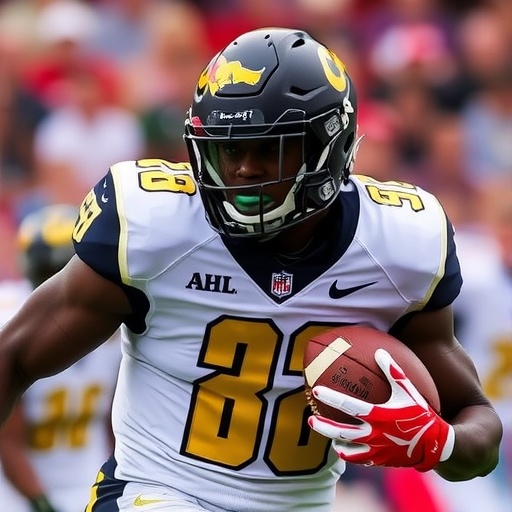Deion Sanders‘ Colorado Buffaloes Routed 53-7 by Utah in Stunning College Football Upset
In a nightmarish turn for Colorado football, head coach Deion Sanders watched his Buffaloes get obliterated 53-7 by the Utah Utes on Saturday, marking the most lopsided defeat of his tenure and igniting fierce debates about the program’s future in the cutthroat world of college football. What was supposed to be a gritty rivalry clash in Salt Lake City devolved into a one-sided rout, with Utah’s relentless offense and suffocating defense exposing every flaw in Colorado’s game plan. This upset—or perhaps more accurately, a predictable pounding given Utah’s form—has left fans stunned and Sanders under the microscope like never before.
The final scoreline doesn’t even capture the humiliation: Utah racked up over 500 yards of total offense, while Colorado managed a paltry 177. The Buffaloes’ defense, once touted as a rebuilding cornerstone under Sanders, surrendered touchdown after touchdown, allowing Utah to score on six of their first eight possessions. For Sanders, known as “Coach Prime,” this 46-point thrashing surpasses any loss from his celebrated coaching stints at Jackson State or his early days at Colorado, raising urgent questions about talent acquisition, strategy, and the hype machine that propelled him to Boulder.
As the clock ticked down in the fourth quarter, with Utah leading 42-0, the ESPN broadcast cut to a somber Sanders on the sidelines, his signature swagger replaced by visible frustration. “We’ve got to regroup, plain and simple,” Sanders said post-game, his voice laced with disappointment. “This isn’t the standard we set. Utah came out hungry, and we weren’t ready.” The loss drops Colorado to 1-3 on the season, their only win a narrow escape against a weaker opponent, while Utah improves to 3-1, solidifying their status as a Pac-12 powerhouse.
Utah’s Offensive Explosion Buries Colorado Early
From the opening kickoff, it was clear Utah meant business. Quarterback Isaac Wilson, stepping in for an injured starter, orchestrated a clinic in aerial assault, completing 22 of 28 passes for 312 yards and four touchdowns. His connections with wide receiver Dorian Singer were particularly devastating, as Singer hauled in 98 yards and two scores, including a 45-yard bomb that silenced Colorado’s secondary in the first quarter.
But Utah’s ground game was equally punishing. Running back Micah Bernard bulldozed through Colorado’s front seven for 142 yards and a touchdown on just 18 carries, averaging nearly 8 yards per rush. The Utes’ offensive line, a veteran unit with three returning All-Pac-12 performers, created gaping holes that turned short gains into explosive plays. By halftime, Utah led 28-0, having controlled time of possession with a 19-minute edge and converting 4 of 5 third-down attempts.
Colorado’s offense, led by freshman phenom Shedeur Sanders—Deion Sanders‘ own son—struggled mightily against Utah’s defense. Shedeur completed 15 of 25 passes for 139 yards but was sacked four times and threw a costly interception in the red zone. The Buffaloes’ running game fared even worse, managing just 38 yards on 22 carries, as Utah’s linebackers, including Pac-12 sack leader Junior Tafuna, swarmed to the ball like a pack of wolves.
Statistics from the game paint a grim picture for Colorado football: Utah outgained them 528-177 in total yards, held a 22-9 first-down advantage, and forced two turnovers while committing none. This wasn’t just a loss; it was a dissection, with Utah’s coaching staff under Kyle Whittingham exploiting every mismatch. Whittingham, in his 20th year at the helm, praised his team’s preparation: “We knew Colorado had talent, but execution wins games. Our guys executed flawlessly tonight.”
Deion Sanders’ Defensive Woes Hit Rock Bottom in Salt Lake City
For Deion Sanders, the defensive collapse was the most alarming aspect of this upset. Arriving in Boulder with NFL pedigree and promises of a turnaround, Sanders inherited a porous unit that has only worsened under his watch. Saturday’s game saw Colorado allow a season-high 53 points, eclipsing their previous worst of 45 in a loss to Oregon earlier this year.
The Buffaloes’ secondary, featuring high-profile transfers like safety Shilo Sanders (Deion’s other son), was torched for 312 passing yards—the most since joining the program. Cornerback Travis Hunter, the two-way star and Heisman contender, played both offense and defense but couldn’t stem the tide, logging eight tackles but no interceptions. Meanwhile, the defensive line registered zero sacks, a stark contrast to Utah’s four on Shedeur Sanders.
Analysts point to deeper issues: Colorado ranks 112th nationally in points allowed per game (38.3) and 105th in total defense (412 yards allowed). Sanders has emphasized recruiting via the transfer portal, bringing in 15 newcomers this offseason, but cohesion remains elusive. “Talent is there, but schemes and discipline aren’t clicking,” said ESPN’s Desmond Howard during the broadcast. “Utah exposed that tonight.”
Post-game, Sanders didn’t mince words about his defense: “We got outcoached and outplayed. No excuses. We’ve got to hit the film room and fix this fast.” This loss echoes Sanders’ challenges at Jackson State, where early-season blowouts tested his resolve, but the stakes are higher in the Power Five, where NIL deals and national expectations amplify every misstep.
Pivotal Turnovers and Penalties Doom Buffaloes’ Comeback Hopes
If there was a single threadbare lifeline for Colorado, it snapped early with a series of self-inflicted wounds. The game’s turning point came midway through the second quarter, when Shedeur Sanders’ interception—tipped by a Utah defender and returned 22 yards for a touchdown—pushed the score to 21-0. That pick-six, off a telegraphed pass to a double-covered receiver, shifted momentum irrevocably.
Penalties plagued Colorado throughout, with 11 flags for 95 yards, including three holdings that nullified potential first downs. A roughing-the-passer call on Utah extended a drive that ended in a field goal, but Colorado’s own false starts and offsides kept Utah’s offense in rhythm. The Buffaloes’ lone score came late in the third quarter on a 12-yard Travis Hunter touchdown catch, but by then, the damage was done—Utah responded with two more touchdowns to salt away the 53-7 final.
Comparing this to recent college football upsets, the margin rivals historic routs like the 2019 Alabama blowout of Duke (59-3), but in a conference rivalry, it stings deeper. Utah, playing at home in the thin air of Rice-Eccles Stadium, capitalized on every mistake, their special teams blocking a punt that led to another score. Colorado’s coaching staff, including defensive coordinator Charles Kelly, faces scrutiny for failing to adjust; halftime tweaks amounted to little more than personnel shuffles that Utah easily countered.
Fans in attendance—many traveling from Boulder—watched in disbelief as the game unfolded. One supporter, Buffs alum Jake Ramirez, told reporters, “I’ve seen bad losses, but this felt personal. Prime promised change; where is it?” Social media erupted with memes juxtaposing Sanders’ pre-season bravado against the on-field reality, trending under #PrimeTimeFlop.
Broader Implications for Colorado’s Rocky Mountain Rivalry
This defeat reshapes the landscape of the Rocky Mountain rivalry between Colorado football and Utah, a matchup steeped in history dating back to 1896. Utah now leads the all-time series 36-25-3, and this win avenges a narrow 23-17 loss to Colorado last season—one of Sanders’ early signature victories. For the Utes, it’s a statement of dominance in the post-Pac-12 realignment era, as they eye a College Football Playoff berth with a balanced attack and stout defense.
Colorado’s struggles extend beyond this upset. With a 1-3 record, the Buffaloes sit last in the Pac-12 standings, their national ranking from Week 2 long evaporated. Recruiting implications loom large: Top prospects like five-star quarterback Julian Lewis, who visited Boulder recently, may reconsider amid the turmoil. Sanders’ NIL collective, Prime Time 303, has poured millions into talent, but results lag—Colorado ranks 80th in returning production per ESPN metrics.
League-wide, this loss underscores the volatility of college football, where hype can crumble under pressure. Comparable to Miami’s fall under Mario Cristobal or USC’s inconsistencies, Colorado’s arc tests whether Sanders’ charisma can translate to sustained success. Athletic director Rick George issued a measured statement: “We’re building something special. One game doesn’t define us, but it motivates us.”
Looking ahead, Colorado faces a brutal schedule: road games at USC and Oregon State, followed by a home tilt against No. 8 UCLA. Sanders has a bye week to recalibrate, potentially shuffling the depth chart and emphasizing fundamentals. Shedeur Sanders remains a bright spot, his poise under duress drawing NFL scout buzz, but the team’s overall trajectory hinges on defensive reinforcements—perhaps more portal additions before the deadline.
For Utah, the victory propels them into contender status. With Wilson at QB and a defense allowing just 18 points per game, the Utes could challenge for the conference title. Their next test: a showdown with Arizona, where another win could vault them into the AP Top 25.
As the dust settles on this 53-7 massacre, the Deion Sanders era at Colorado enters a defining phase. Can the Buffaloes rebound from the brink, or will this upset mark the beginning of a steeper decline? The answers lie in the coming weeks, but for now, Boulder faithful are left grappling with dashed dreams and a program at a crossroads.








